Feeding goats properly is essential to the overall health of the herd, and to the success of any meat goat, dairy goat, or fiber goat homesteading operation.
Goats are ruminant animals, they have four stomach chambers. When they are eating the wrong type of food, too much of the right kind of food, or introduce feed changes too quickly, their rumen gets out of whack, and can cause potentially deadly bloat or other serious medical issues.
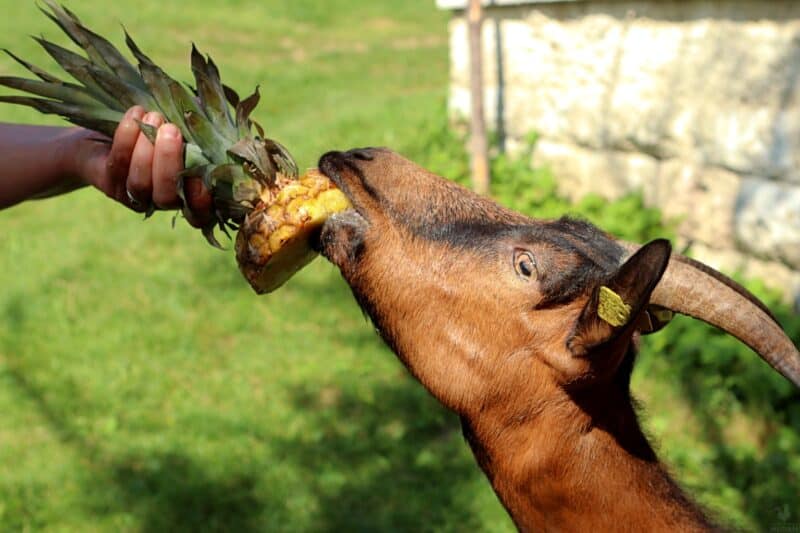
To keep the ruminant stomach chamber healthy and fully functional, a goat must eat enough roughage and avoid ingesting too much rich grain feed.
Some goats tend to be more prone to bloat than others, which means a keeper may need to adjust feeding habits slightly and provide more of an administered free-choice supplement (baking soda).
Without further ado, here’s everything goats can and cannot eat. You can find the printable at the end of this article. Enjoy!
Table of Contents:
Grain
Grain feed should be only a small part – if at all, of the goat’s diet. A goat that consumes too much grain is at increased risk of health issues – like bloat. Quality grain feed is comprised of significant percentages of protein, minerals, and vitamins.
If feeding grain to goats it should account for no more than 10% of their overall daily food intake. Dairy goats are sometimes given more grain than meat and fiber goats in an attempt to enhance milk production.
Sweet mixed that have a high percentage of molasses should only be given (if at all) in incredibly small amounts or to pregnant and nursing nanny goats to give them a calorie boost.
Hay
A goat should eat between 2 to 4 pounds of hay on a daily basis. This recommended amount varies based on the maturity of the goat, stature (miniature goats, standard goats), and takes into account the enhanced caloric needs of pregnant or nursing nanny goats.
Goats are browsers and not grazers like horses and cattle. They can garner some if not all of their daily roughage intake while wandering around your homestead eating grass, weeds, brush, leaves, and similar natural items – at least during the warm weather parts of the year.
Even during the winter time goats can browse for a portion of their roughage intake, depending on your climate, and how much space the herd has to roam and forage for food.
The quality and type of hay provided to the goat herd matters a great deal from a rumen health and nutrient intake perspective. Suffice it to say that all hay is not created equal.
Leafy legume-type hay is recommended for goats. This type of hay is usually comprised of alfalfa, soybeans, vetch, and clover.
Goat kids as well as their nursing mommas typically thrive on a legume style of hay. Mature goats, regardless of type, usually prefer a grass and legume-style hay mix to fulfill their dietary needs.
Being a small to medium-sized livestock, goats generally will not eat grass-style hay unless it is their only option. Their small mouths are not well equipped to eat such a coarse variety of hay.
Alfalfa Hay
This legume style hay boats a high protein, fiber, vitamin A and calcium percentage. Alfalfa hay is comprised of roughly 15% to 22% crude protein, and 32% crude fiber.
The leafy fiber strands are longer than the ones produced by grass hay. Goats will ingest approximately 120% more energy from alfalfa hay that they would from an oat style of hay.
Orchard
This style of hay is lower in protein than alfalfa hay but boasts a higher percentage of fiber. Orchard grass hay is comprised of about 30% crude fiber and 7% of crude protein.
Cereal Grains
A cereal or oat type of hay is lower in protein than either alfalfa or orchard grass hay but is comprised of a higher carbohydrate and fiber percentage.
Goats tend to love this type of hay because it is sweet and is soft enough that they can consume it right down through the stem easily.
A diet of only cereal grain hay would not be good for goats due to its lack of protein content, but mixing some cereal grains into your hayfield or buying hay from someone who does, will be welcomed as a tasty and healthy hay bale treat.
Cereal grain hay is comprised of 9% crude protein, and also has a significant manganese, zinc, and phosphorus content.
Timothy
This style of hay is a nice mix of essential nutrients, but it also has a lower protein percentage than alfalfa hay. Timothy hay is comprised of approximately 7% crude protein, and 32% crude fiber.
Safe Treats for Goats
Treats should only be given as a training aid or in small amounts on any type of a regular basis.
It can be difficult for some goat owners not to provide too many healthy treats because the goats love them, but too much of a good thing can also cause rumen problems.
Training the goats to stay in their pen, free-range on your homestead, or simply to establish trust so the animals run towards and not away from you if injured or trapped in fencing are all great reasons for giving small amounts of healthy treats.
You can plant many of these healthy treats in the goat herd browsing area, or inside their pen as a free choice snack.
But, if you go this route, expect the herd to devour all of the treats quickly – often before the plant matures and produces the yields that they would most enjoy.
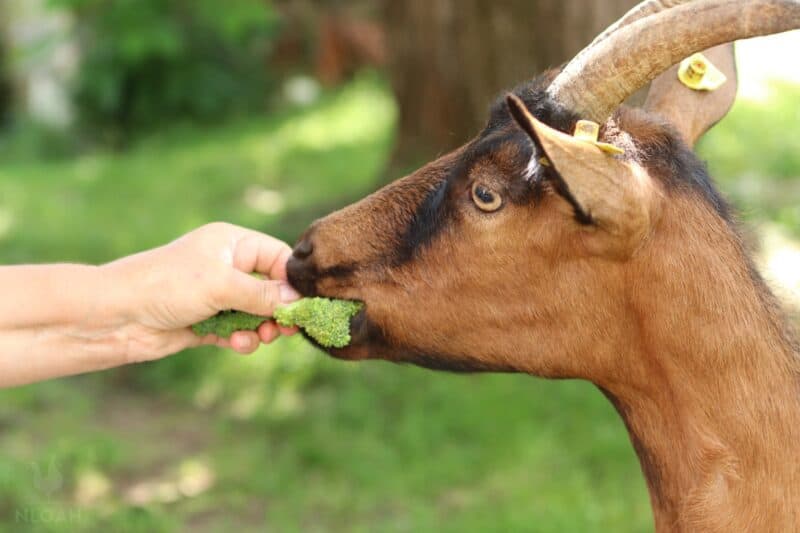
104 Things Goats Can Eat
| Jojoba | Black Locus |
| Lemongrass | Poison Oak |
| Yellow Locus | Poplar Tree Leaves |
| Wandering Jew Plant | Poison Sumac Vines |
| Peppers | Lilac Bark |
| Ginger Root | Mint |
| Monkey Flower | Roses – entire Bush |
| Jambolan Leaves | Mullein |
| Virginia Creeper | Raisins |
| Greenbrier | Coyote Bush |
| Sassafras | Douglas Fir |
| Marshmallow Herb | Strawberries |
| Spruce Trees | Amaranth |
| Salvation Jane Plant | Peas – cooked |
| Elm Tree Leaves and Bark | Jerusalem Artichokes |
| Blackberry Bushes | Clover |
| Black Eyed Susan | Cottonwood |
| Catnip | Bay Leaves |
| Lavender | Beets |
| Collard Greens | Pomegranates |
| Soybeans | Cow Peas |
| Oranges | Cedar Leaves, Bark, and Needles |
| Mustard Seed | Yarrow |
| Daisies | Peaches – after removing pits |
| Red Clover | Indian Currant |
| Watercress | Calendula Flowers |
| Bramble | Corn |
| Sunflowers | Grapefruit |
| Garlic – in very small amounts and to help naturally prevent worms | Bananas – some goats prefer only the peels |
| Plantain | Dill |
| Kudzu | Camellia Flowers |
| Arborvitae | Thyme |
| Fennel | Lemon Balm |
| Honeysuckle | Rosemary |
| Turnips | Dandelions |
| Cauliflower | Cantaloupe |
| Squash | Mango |
| Mustard – spice | Oregano |
| Sow Thistle | Watermelon |
| Oats – raw or cooked | Pumpkin |
| Oak Tree Leaves | Cabbage |
| Peppermint | Apples |
| Mesquite | Broccoli – raw or cooked |
| Unsalted Sunflower Seeds | Celery |
| Carrots | Pears |
| Weeping Willow | Raspberry Bushes |
| Black Raspberry Bushes | Wild Tobacco |
| Wax Myrtle | Cucumber |
| Grape Vines | Kiwi |
| Mushrooms | Pine Needles |
| Pineapple | Lettuce |
| Blueberries | Popcorn |
| Nuts (almonds, cashews, pistachios, etc) | Spinach |
| Grapes |
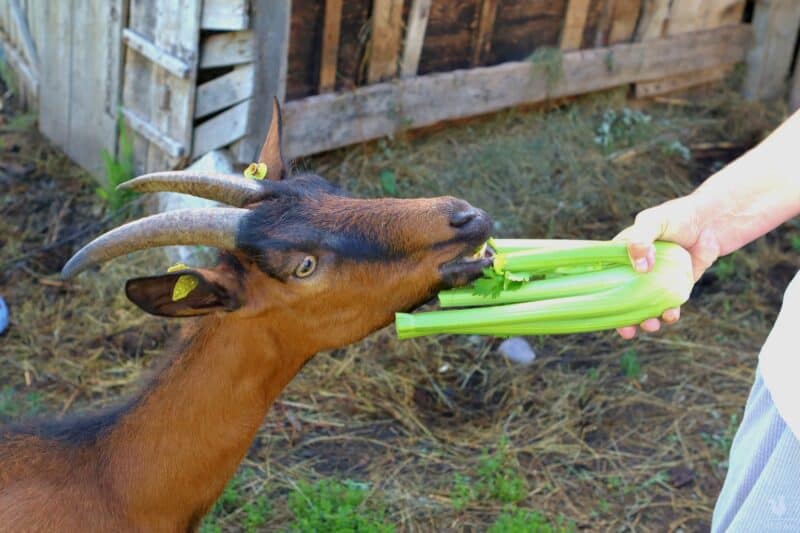
Do goats eat poison ivy?
Despite being one of the worst things that people can come into contact with, poison ivy does not bother goats at all. In fact, they seem to quite like eating it.
Do goats eat other types of ivy?
Goats like eating all kinds of other ivies, too, not just poison ivy. you can expect your goats to eat vines, leaves, and everything.
Do goats eat bread?
Goats can have bread, crackers, and the like, but only very, very sparingly as a rare treat and never as a staple of their diet. Bread is made from flour, which is made from grains, and grains can be very harmful to goats since they facilitate bloat.
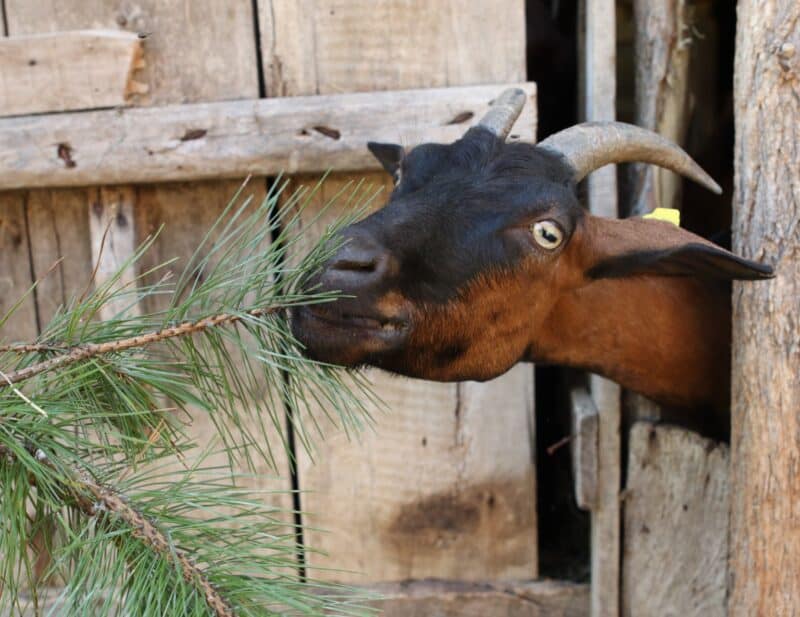
Do goats eat pine needles?
Yes, goats can have pine needles from most kinds of pine trees. Though they seem very unappealing to us, pine needles are actually packed with vitamins and some minerals that are good for goats.
Do goats eat popcorn?
yes, goats can have a little bit of popcorn as a treat so long as it does not have any extra salt, butter or other flavorings on it. Corn is a grain, and as you likely already know grains can be very bad for goats in anything except strictly limited amounts.
Do goats eat straw?
Yes, goats can safely eat straw although it is mostly devoid of nutrition compared to hay. As always, the type of grass the straw comes from makes a difference. You don’t need to worry too much if your goats take a few nibbles of their bedding here and there.
Do goats eat roses?
Yes, they sure can, thorns, branches, and all. It is difficult for us to watch goats scarf them down because rose thorns are viciously sharp, but goats don’t struggle with them at all, and rosebuds and rose hips are packed with good nutrition for goats.
Do goats eat maple leaves?
Yes, goats can eat maple leaves but should only eat them in limited quantities. Don’t be surprised to see your goats eating maple leaves when the opportunity presents itself, but they usually won’t go out of their way for them.
Do goats eat horse feed?
Yes, they sure can. Horses are herbivores just like goat. Goats can eat horse feed without any over danger so long as they aren’t allowed to overindulge on it.
However, the nutritional requirements of horses and goats are quite different, and horse feed is nowhere near nutritionally complete for the needs of goats.
Do goats eat rice?
Yes! Contrary to a persistent urban legend, rice won’t kill your goats outright by making their stomachs explode or any such nonsense.
Rice, raw or cooked, is safe for goats but it generally is not a staple of their diet. Don’t make rice the main item on their menu, and they can enjoy a little bit every now and then.
Do goats eat fruit?
Yes. It is a surprise to some people, but goats can eat fruit and most generally enjoy it. However, it is very high in sugar, obviously, which can contribute to bloat and other problems in goats.
Fed on a limited basis with careful attention paid to their nutritional intake it can make for a nice supplemental treat in their diet.
Do goats eat honey?
Believe it or not, yes, they can. Most goats love the taste, and honey is safe for goats so long as they get only a little bit. despite being natural and wholesome, honey is extremely sweet, as you know. Also, think twice before giving goats raw honey as they do run a risk of bacterial infection when eating it.
Do goats eat rosemary?
Rosemary, like many herbs, is safe for goats. however, the pungent oils that give rosemary its alluring aroma and flavor can be hard on a goat’s stomach so you don’t want to let them eat too much. But, they graze on a little bit here and there it won’t be a problem.
Do goats eat orchard grass?
Yes, they can. Goats can eat pretty much every kind of grass there is, orchard grass included. As with all such pasturage, goats must be allowed to adjust to it slowly to avoid complications.
Do goats eat leaves?
Yes, big time. Goats are browsers and usually eat the choice bits from all kinds of different plants and you had better believe this includes leaves of all types.
Goats, as a rule, prefer tender, green leaves, not old crunchy ones but they may eat fallen, dead leaves from time to time.
Do goats eat eucalyptus?
Yes. Koalas aren’t the only mammal that eats eucalyptus. Goats will eat eucalyptus leaves and bark, and are known for eating freshly fallen leaves wherever they find them.
However, eucalyptus leaves offer very little nutrition, even for the intensive digestion process that goats employ so they should never be anything more than an incidental part of their diet.
Do goats eat honeysuckle?
Yes! Goats enjoy every part of the tender honeysuckle plant, including the leaves, flowers and shoots. Honeysuckle can give goats a good boost of nutrition in the form of vitamins and minerals.
Do goats eat lamb’s quarter?
Yes. Lamb’s quarter will not hurt goats, and they will eat most parts of the plant.
Do goats eat dandelions?
Yes. Most homesteaders know by now that dandelions are no mere weed. Packed full of vitamins, dandelions are an important component in a free-range goat diet. The buds in particular are highly nutritious, but most goats will eat them right down to the ground.
Do goats eat silage?
Yes. High-quality silage is a viable feed for goats, though owners are cautioned to ensure that the silage is compatible with their existing diet.
Goats that are inadvertently fed silage with a high amount of clover or alfalfa in it might suffer from devastating bloat that can kill them.
Do goats eat ferns?
Yes, they can. Though there are some ferns out there that are toxic to goats, most are not, and in most places goats are unlikely to encounter them growing wild. So long as you take care to verify what species is in your area, your goats won’t have any problems with them.
Do goats eat marigolds?
Yes. Marigolds are an iconic flower that happens to be completely edible and pretty nutritious for your goats. that’s great news for you if they are growing wild, but bad news if you are trying to raise decorative marigolds. you better keep your goats away from them in the latter case!
Do goats eat lilacs?
Yes. Another flower renowned for its delicate beauty, lilacs will not harm goats, though they don’t particularly stand out nutritionally.
Do goats eat quinoa?
Yes. Quinoa is a seed that is closely related to both spinach and beets, though it is prepared and treated as a grain culinary. Renowned for an excellent nutritional profile, goats can benefit from having some quinoa in their diet, though it should not be the majority component of their diet.
Do goats eat dairy?
Yes. Goats, like all mammals, can ingest and process milk, but they give it up as they mature into adulthood. Your goats might occasionally like a little bit of milk, yogurt, or other plain dairy foods as a treat, but make sure you keep an eye on both sugar and salt content. Avoid processed dairy foods and the like.
Do goats eat knotweed?
Yes, thankfully! This incredibly invasive weed is extraordinarily difficult to remove, much less exterminate, but goats will happily chow down on the tough, wiry stalks where they find it.
Although not likely to be a major component of their diet, it is reasonably nutritious for goats and you’ll benefit from using them as a control method.
Do goats eat mint?
Yes, they can. Mint, like most highly flavorful herbs, is it safe for goats but also like most other herbs the intense oils contained in mint might upset the stomach of goats. don’t worry about them grazing on a little bit here and there, but don’t make it a point to give them a lot of it either.
Do goats eat juniper?
Goats can eat juniper, but very sparingly. The juniper plant and especially the berries contain powerful oils that can cause serious indigestion in goats and potentially even cause kidney harm if they overindulge. Depending on the species of juniper and even the individual plant, the quantities of these oils can vary.
Do goats eat jasmine?
Yes. True jasmine plants are totally safe for goats.
Do goats eat oregano?
Yes, they sure can. Once more, oregano is an herb that is safe for goats but a little bit will do them: the powerful oils contained in oregano might give goats indigestion if they eat too much, too quickly.
Do goats eat nettles?
Yes! Goats may eat nettles, including stinging nettles. Furthermore, goats seem completely immune to the stinging effects of the latter, so they will definitely benefit from the excellent nutrition of this plant.
Do goats eat foxtail?
Yes. Foxtail is a safe and healthy menu item for goats when they are browsing.
Do goats eat magnolia leaves?
Yes. The magnolia tree is famous for producing large, showy, and alluringly fragrant blooms but your goats won’t care about that. They will care about eating those large, crispy leaves, though!
Do goats eat Queen Anne’s lace?
Yes. although the compounds present in the sap of Queen Anne’s lace is known for causing irritation and blistering in humans, goats seem totally unaffected and will happily eat all parts of the plant.
Do goats eat zinnias?
Yes, they can. Zinnias are completely safe for most known animals, including goats. Take care if you are growing these spectacularly pretty flowers for decoration because your goats will make short work of them.
Do goats eat fennel?
Yes. Fennel is known for its strong, licorice-like taste, but this is no impediment to goats whatsoever.
Do goats eat dogwood?
Yes. Dogwood bark and leaves are regularly eaten by goats with no ill effects whatsoever.
Do goats eat spicy food?
Surprisingly, yes, they can. even more surprisingly most goats seem to enjoy spicy food in the form of hot peppers. Goats do not seem adversely affected by the capsaicin present and jalapenos, habaneros, and the like.
Do goats eat kudzu?
Yes. Goats can eat kudzu, and this is another tough, invasive plant that goats are sometimes employed against in an effort to cut it back. Do keep in mind that some toxic and inedible plants will grow among kudzu, though, so make it a point to inspect any stands before letting your goats tuck in.
Do goats eat lemongrass?
Yes! Goats seem to enjoy lemongrass like every other kind of grass. We cannot say that the fragrant flavor of lemongrass attracts them but it definitely doesn’t bother them.
Do goats eat pomegranates?
They sure can. Goats can technically eat every part of a pomegranate, including the hard outer skin, tough inner membrane and of course the juicy, tangy seeds, but they will greatly prefer the seeds above all of the other parts.
As with most fruits, take care of it you do not allow your goats to overindulge on pomegranates since they are high in sugar.
Do goats eat Virginia creeper?
Yes, they can. Virginia creeper is a delicate and attractive ornamental or an invasive and destructive menace depending on who you ask and depending on where it is growing. It is known for its toxic berries aside from its destructive habits, but neither will impede your goats at all.
Do goats eat spruce trees?
Yes. Like many other trees, goats enjoy eating the shoots, bark, and leaves of spruce trees.
Do goats eat dill?
Absolutely. Pretty much every common herb that people eat goats can also eat wherever it is growing fresh or wild. The clear, bracing flavor of dill is one that goats seem to enjoy, and they will eat it right down to the ground when given a chance.
Do goats eat raspberry bushes?
As painful as it is to watch, yes, goats can eat raspberry bushes whole. Branches, leaves, thorns, berries all of it. the tissues in a goat’s mouth are especially tough, and their teeth are well suited to grinding, meaning they will break down and process the thorns before swallowing, so you don’t need to worry about mishaps most of the time.
Do goats eat mint?
Yes, they can! Mint is another herb that is on the menu for your goats. Interestingly, the menthol compounds in mint that give it its pleasantly cool chill are actually designed as a defense mechanism against insects and some mammals. Too bad for the plant, it doesn’t slow goats down at all!
Do goats eat daisies?
Yes, daisies are one more iconic and pretty flower that is commonly eaten by goats. All parts of the plant are safe, and daisies contain a fair amount of nutrition, including compounds that can improve cellular health so these are a great component of any goat’s diet.
Do goats eat beets?
Yes, they can. All parts of a beet are safe for goats, including the greens and the hard, root part. Note that goats might have a difficult time eating a whole beat, so if you are planning on serving it to them cut it up into manageable chunks to reduce the chances that they will choke on it.
Do goats eat arborvitae?
Yes, goats may safely eat arborvitae like most evergreen trees.
Do goats eat peas?
Yes, they can. Goats can eat all kinds of peas, including green peas, snap peas, black-eyed peas, and more. Peas are a healthy snack option or supplement for goats, but should not be the majority component of their diet.
Do goats eat oregano?
They sure can. Oregano is just another herb that will go down the hatch if goats manage to find it. Although it is not nearly as pungent when it is live or fresh compared to when it is dried, it nonetheless contains oils that could, in quantity, upset a goat’s stomach.
So long as you aren’t allowing them to go completely crazy when eating oregano this shouldn’t be a problem, however.
Do goats eat watercress?
Yes. Goats can eat watercress stem and all safely. As a great snack or just something to keep them interested in their diet, it is a wonderful, light and nutritious addition to their diet.
Do goats eat lemon balm?
Yes, they can, and they should. Lemon balm is an herb that is highly flavorful but more importantly packed with good nutrition in the form of vitamins and minerals and it contains abundant vitamin A, along with some B vitamins and plenty of vitamin C.
Don’t hesitate to let your goats graze on this stuff or toss a little bit in with other greens when supplementing their diet.
Do goats eat clover?
Yes, but cautiously. Clover is a menu item for goats that they will eat regularly, but you must take care that they do not get too much clover, too quickly.
Some types of clover can be particularly troublesome for a goat’s digestion. As always, moderate the quantity, introduce it slowly and keep a close eye on the health and activity of your goats in case it disagrees with them or causes bloat.
Do goats eat Douglas fir?
Yes. Fir trees, including Douglas firs, or another evergreen that goats love to munch on. The greenery is rich in vitamins and the bark will provide them with much-needed bulk in their diet.
Do goats eat sassafras?
Sassafras trees are highly aromatic and renowned for both medicinal and culinary uses in the form of teas and infusions. Goats will be entirely happy to eat the leaves, branches, and bark of sassafras trees wherever they might be growing.
Do goats eat thyme?
They sure can. Thyme is an intensely fragrant herb that goats will eat up happily.
Do goats eat catnip?
Yes, although we should perhaps be thankful that catnip does not have the same effect on goats that it does on cats!
Do goats eat ginger root?
Yes, and goats seem to love eating ginger root. Packed with vitamins A, B and C along with lots of minerals and having known benefits for digestion and overall wellness, this can make a great addition to a goat’s diet.
Just one word of warning, however: you should never feed your goat any ginger root that has been pickled or otherwise prepared for human consumption because it will likely contain lots of things that they don’t need.
Do goats eat bay leaves?
Yes. Although people only use them to season soups and stews, goats can consume bay leaves in their entirety.
Do goats eat peppermint?
Yes, they can. Another bracing herb containing high quantities of menthol, goats seem to love eating the stuff and it is generally good for them, although overconsumption might cause some discomfort or indigestion.
Do goats eat soybeans?
Yes. Soybeans are a great source of protein and carbohydrates for goats, and are an increasingly popular choice for supplementing their diets either whole or in the form of feed. Soybeans are such a dependable protein option for goats that some farmers are looking to them as a replacement for alfalfa.
Do goats eat red clover?
Yes. Red clover is basically just clover as far as goats are concerned, and so long as they aren’t having issues eating other kinds of clover you can let them browse on red clover. But, if you are in doubt acclimatize them to it slowly.
Do goats eat mesquite?
Yes. Although it is known for giving our own food that smoky, unique flavor when incorporated as a cooking wood, mesquite is known to contain resins that can be toxic to some animals. Not goats, however, which will eat the bark and the leaves with equal enthusiasm.
Do goats eat wax myrtle?
Yes. Although it is known to be a deer-resistant plant, it definitely isn’t goat resistant! It is no wonder that goats are attracted to the stuff because it is so aromatic.
One thing to keep in mind is that there is a chance that regular consumption of wax myrtle might alter the flavor of goat milk and associated products. A hard verdict on this is still out, but there are plenty of anecdotal reports from owners, so take care.
60 Things Goats Cannot Eat
Not only are some kitchen scraps or store-bought foodstuffs not safe for your goats to eat, some naturally growing matter that could be in the browsing area of pen can even be dangerous to deadly.
The most common plants you shouldn’t feed your goats include kale, acorns, azalea, avocado, pine trees, deadly nightshade, cherry trees, and plum trees. Here’s a full list just below:
| Elderberry Trees | Maya-Maya |
| China Berry Trees | Burning Bush |
| Plum Trees | African Yew |
| Lilac Flowers | Coriaria Arborea Plant |
| Red Maple Trees | False Tansy |
| Brouwer’s Beauty Andromeda | Ficus |
| Althea | Boxwood |
| Oleander | Bracken Ferns |
| Horse Nettle | Chokecherry Trees |
| Mayapple | Flixweed |
| Holly | Garden Iris |
| Japanese Pieris | Water Hemlock |
| Castor Oil Plant | Cestrum |
| Lily of the Valley | Morning Glory Flowers |
| Yew | Cherry Trees |
| Ponderosa Pine Trees | Laburnum |
| Poison Hemlock | Potato Weed |
| Pokeweed | Acorns |
| Azaleas | Fiddleneck |
| Mountain Laurel | Ngaio |
| Fiddleneck | Blue Lupin |
| Dumb Cane | Iceland Poppy |
| Nightshade | Kale |
| Rhubarb Leaves | Calotropis Plant |
| Datura | Raw Potatoes |
| Buttercups | Dog Hobble |
| Avocadoes | English Ivy |
| Rhododendrons | Fireweed Plant |
| Foxglove | St. John’s Wort |
| Japanese Yew | Goat’s Rue |
| Gourds | Eggplant |
Can goats eat chocolate?
No, goats should not eat chocolate! Chocolate is made up mostly of cocoa, which contains theobromine, an alkaloid that is significantly toxic to most mammals, including goats. The darker the chocolate the worse it is for goats.
Can goats eat peanut butter?
No, your goats should not have peanut butter very often or at all. Peanut butter is made up mostly of peanuts, which are legumes, not nuts. Ingestion of legumes is associated with severe bloat in goats, so the one-two punch of concentrated legume paste with sugars and other ingredients they don’t need is sure to knock them for a loop.
Can goats eat chicken feed?
A little chicken feed won’t hurt a goat, but they shouldn’t eat it. Most chicken feed contains animal proteins that goats don’t need, and chicken feed is nowhere near nutritionally complete enough to keep goats healthy. No need to panic if they eat a little bit, but don’t make a habit of it.
Can goats eat dog food?
Goats should not eat dog food, and especially not eat it regularly, but a few nibbles of dry dog kibble will not hurt them. All dog foods contain way too much animal protein to be good for goats.
Can goats eat meat?
No! Goats are strictly herbivores, they don’t eat meat. You might convince a goat to eat meat, but at best it won’t be able to process it effectively, and it will get sick. At worst, it could make them deathly ill or even kill them.
Can goats eat hemlock?
No! There is a wide variety of hemlock plants, but the most common ones, especially water or poison hemlock, are extremely toxic. Keep your goats well away from them, as they might eat them by mistake.
Can goats eat french fries?
Absolutely not. French fries completely desert whatever nutritional benefits potatoes might have once they are cooked in roiling oil and salted to oblivion. You can expect your goats to get very sick if you feed them french fries. Don’t do it
Can goats eat holly leaves?
No, all parts of the holly plant, including the leaves, contain a variety of toxins that can severely harm the health of goats. Goats typically avoid holly, but then again they might not so try to keep them from accessing it.
Can goats eat eggs?
No! Once again, goats are herbivores. Goats will be unable to process the proteins and cholesterol present in eggs, and at best will get very sick if they eat them.
Can goats eat irises?
No. Irises are beautiful, but all parts of the flower and plant are toxic for goats. This is another flower that you can expect goats to avoid instinctively, but you should never bet on it just to be safe.
Can goats eat nightshade?
Generally no. there is actually a wide variety of plants and vegetables in the nightshade family, among them tomatoes and potatoes, but in this case, we’re talking about the iconic deadly nightshade. It lives up to its name if your goats eat it!
Can goats eat lantana?
No. Yet another beautiful and beguiling flower, but one that is packed with dangerous toxins that can cause severe liver damage and death. All parts of the plant contain this toxin, so keep your goats away from it.
Can goats eat ice cream?
Absolutely not! goats drink milk when they are young, and adult goats can handle a little bit of dairy in their diet periodically as a treat, but ice cream is never okay. Completely packed with sugar, this is a great way to completely wreck your goat’s stomach.
Many newbie goat keepers give salted crackers or bits of bread to their goats. This type of snack is not necessarily deadly, but can lead to significant health problems – especially bloat.
A goat, or any ruminant animal that consumes too much grain will have digestion and gas build-up problems.
If you give bread, crackers, or even graham crackers to members of your goat herd, do so as only a special or rare treat, and not a daily or weekly small amount treat.
Never give off treats before the goats have eaten their daily ration of hay. The goats should first have healthy food that will foster proper rumen function in their bellies, and not gobble down a snack or even grain ration, before their base healthy dietary meal.
Goat Supplements
Some goat supplements should be provided as a free choice “treat” on a daily basis, but others may need to be offered only at specific times of the year or when a goat herd member is showing signs of a deficiency or illness.
Baking Soda
Keep baking soda in a small feeder inside the goat pen so it is always available for herd members to munch on.
When a goat is starting to bloat or is bloated, it typically gravitates to the baking soda to help alleviate the increase in gas buildup.
Salt Blocks
Place a salt block on a clean and dry spot to help the goat herd replenish essential vitamins and minerals they lose when expending energy, and especially during the hot summer months.
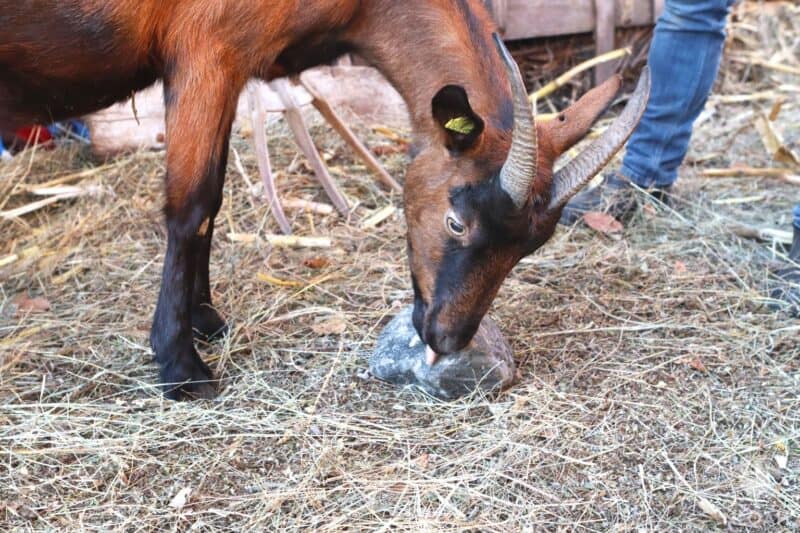
Mineral Blocks
A mineral block for livestock works basically like a vitamin for human beings. By licking the mineral blocks a goat can help infuse more calcium, potassium, sulfur, copper, sodium, manganese, iron, iodine, and zinc into their system.
Some mineral blocks also contain salt, but not all. Also, sheep mineral blocks do not typically contain copper, which is a superb supplement for goats.
Either buy goat-specific mineral blocks or read the content label carefully to figure out what nutrients the goat herd will ingest when licking the block.
Diatomaceous Earth
This agricultural-grade substance can be sprinkled over livestock grain rations or stirred into the grain feed storage tub to be fed as a supplement to the goat herd.
Diatomaceous Earth is a natural toxin remover and deworming agent that may help prevent parasites and bacteria from harming the health of your livestock.

If you want to save the two lists to print out later, you can get them both here. After you open the link, you’ll get a chance to save a copy to your computer, phone, or tablet.
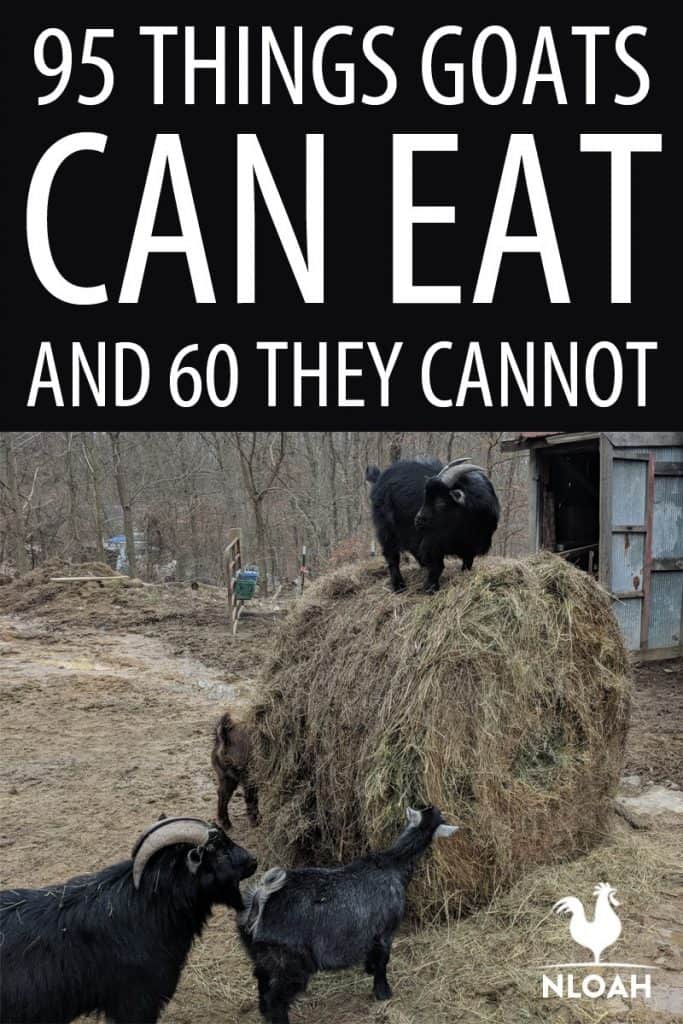

Tara lives on a 56 acres farm in the Appalachian Mountains, where she faces homesteading and farming challenges every single day, raising chickens, goats, horses, and tons of vegetables. She’s an expert in all sorts of homesteading skills such as hide tanning, doll making, tree tapping, and many more.

Hi, can goats eat iceplant? Thanks in advance for any info.
Thuja is an arborvitae and it is poisonous. And yes the seeds of Mimosa (Persian silkwood) are totally neurotoxic to anything that eats them. I pulled out the thuja and mimosa trees when i inherited my grandparents farm and got goats.
Pecan tree leaves? I need to cut down several limbs and thought they may like something different. Thanks in advance.
What about young acacia trees, anise and foxtails?
I see everyone asking if goat’s can eat acorns and nobody has had an answer. I would like to know if they can eat them too,cause I have oak trees. Please If anybody knows I would really appreciate it. Don’t want them sick.
no
They can’t it’s on the list up top
Our goats eat them but seem to self limit their intake.
No acorns
In Oregon our goats love acorns. For 10 years now they have eaten acorns and oak leaves and morning glory.
They can eat morning glory vines, but should not be allowed the flowers.
I just bought two females – about 2 months old. I have read in a few books and on your website about legume hay (such as alfafa) being beneficial to kids. The woman I bought them from told me that she thinks it is too rich for goats and recommended coastal hay (we’re in Florida). I also read somewhere where people did a combo of grass hay and alfafa. Do you think the seller is wrong about the alfafa being too rich for them? They are Nigerian Dwarf goats – only about 10 pounds at this point. Thank you.
I give my goats alfalfa hay. That is what was recommended to me by the lady I got my 2 sister Nigerian dwarf goats from. Tractor Supply also recommended it. I also give them goat feed and a salt block. They love watermelon and apples and I also give them the salad in a bag. I live in Arizona. I’ve had my goats for 2 years and they’re doing well.
I have been told by my vet never to feed alfalfa hay to goats (especially to a castrated male). My goat refuses to eat any type of hay anyway, so I don’t have to worry.
Poison ivy? yes or no for Kiko goats
Absolutely, they LOVE IT!!
NO!
Eucalyptus is missing from the “can NOT eat” list.
Because it is in the CAN eat list!
If I have kale in the pasture of the goats, is that going to be concerning? Also, what about some of these others like turnip greens, chicory, buckwheat, plantain, millet, lentil, winter pea, flax, radish safflower or Camelina?
I have a field I was going to use for another purpose with all of this group cover and now want to use it for goats.
do not give your goats Kale. it ruptures their blood vessels and will urinate blood. my goat developed blood clots in her bladder and her bladder ruptured. she was in horrific pain and had to be put down. my other goat never fully recovered and eventually died
I was surprised to see acorns listed on the “bad” list! My goats LOVE acorns! Don’t know if it matters what kind of acorn. I’m pretty sure I have mostly white oaks around here.
I have also heard that the seed pods of the Mimosa tree is deadly for them. I have a few around here I need to clear out.
Was wondering about the acorns, my goats love them too!
Identify the mushrooms you have. There are many varieties of mushroom that are toxic and should be avoided.
Remove the mushrooms, give the goat fresh hay, water and goat mineral free choice
Hello, do goats naturally stay away from ingesting things that are bad for hem?
Yes, as long as there are healthy food choices for goats available, goats will choose the healthier goat acceptable food; for instance, goats will choose healthy hay forage and avoid nightshade.
Not necessarily. If it’s palatable, they’ll eat it.
I have bougainvillea in my yard. My girls won’t eat them. I’m thinking they must know they’re not good for them.
No. They like to investigate which is why they eat paper and try eating plastic. And when they are really hungry, anything goes.
How about pine trees?
Mine eat them and love them, have had no I’ll effects at all from it!
Irises? Good/bad
Bad
Hey Tara, can you tell me if goats are able to eat ground cedar? Links below for the plant. I am planning a new turnout and found a lot.of this stuff growing throughout the area.
https://en.m.wikipedia.org/wiki/Diphasiastrum_digitatum
Can goats eat Camelia leaves. I feed them the flowers, but do not have a definite answer on the leaves.
Thank you!!!!
Can goats eat yogurt?
No
YES!! GOOD for GUT health but just PLAIN and preferably ORGANIC yogurt (milk used)
I give 1/2 cup every OTHER day to a 13 year old Nubian. I mix in another 1/2 cup of whole oats or maybe they are groats into the yogurt.
I do this for her health. you can do the same for chickens
Nance, good adds to the list. Thank you.
Very nice
It doesn’t mention to never allow your goat to eat rhodedrendons or azeleas!! These are the only plants that have made my goats VERY sick!
Read the list of “60 Things Goats Cannot Eat.” She includes azaleas and rhododendrons on that list.
And i would like to know if they can eat mushrooms, cus one of are goats are sick and their is mushrooms growing in their pen. Please please tell me if they can becuse he is quite sick. Here are the symtums , snot ,not eating,hard time pooping.